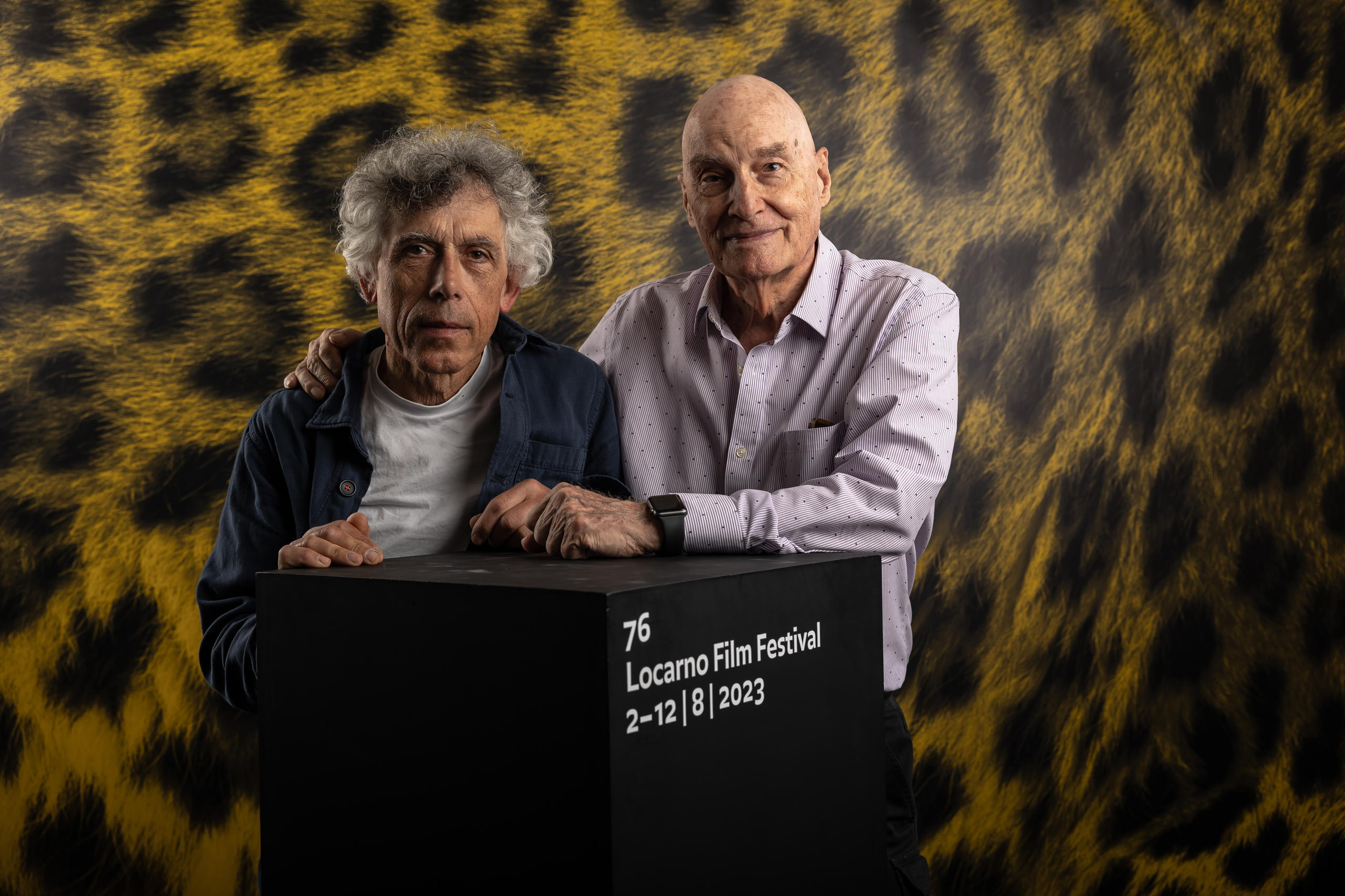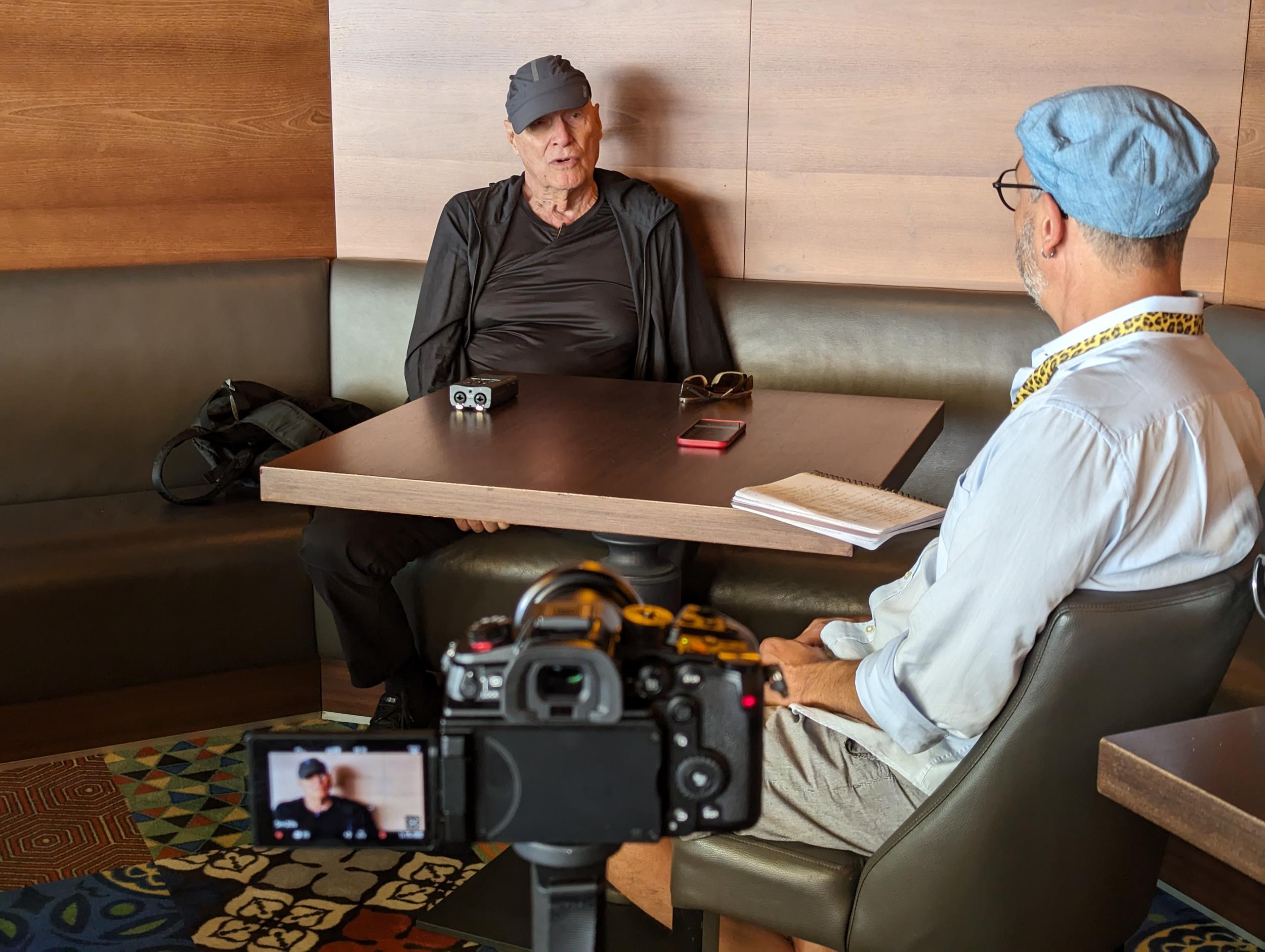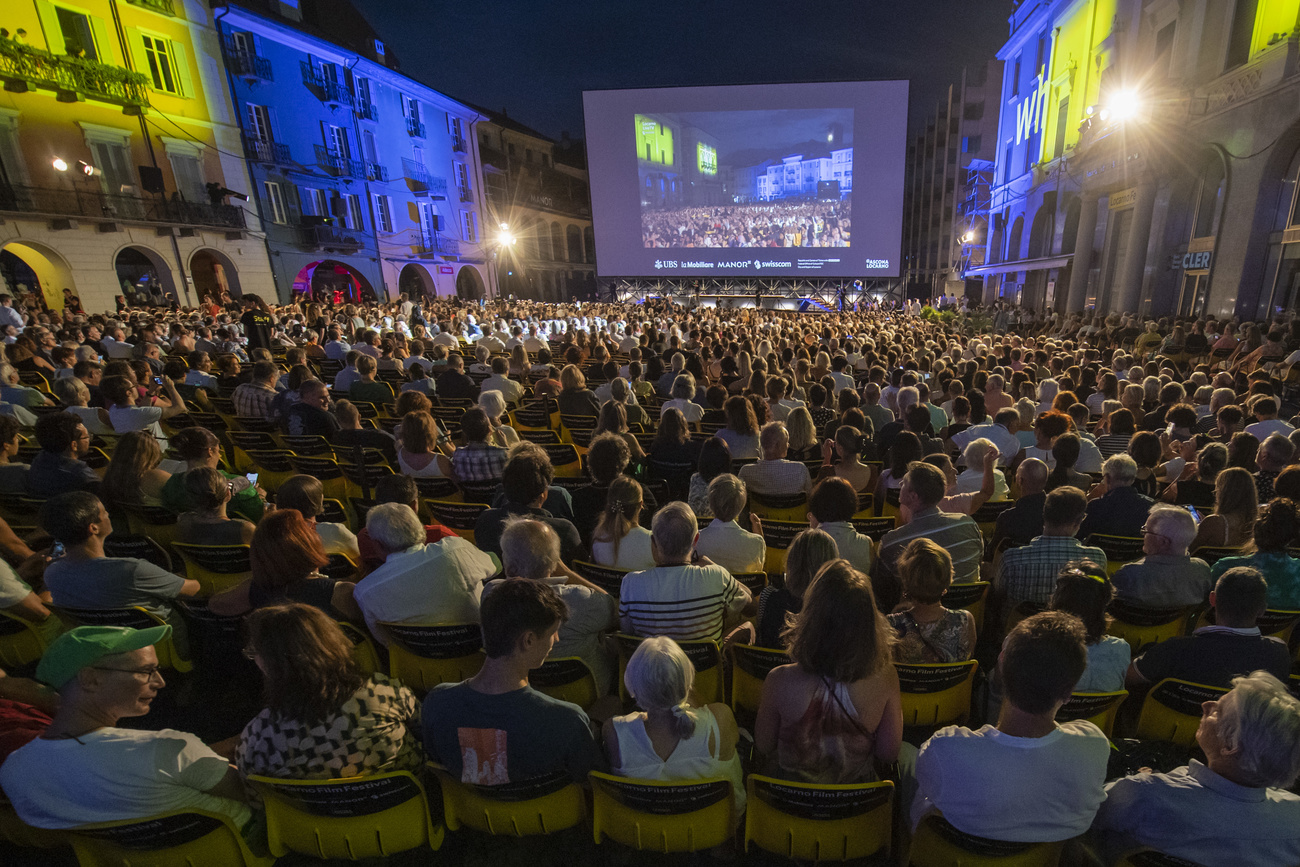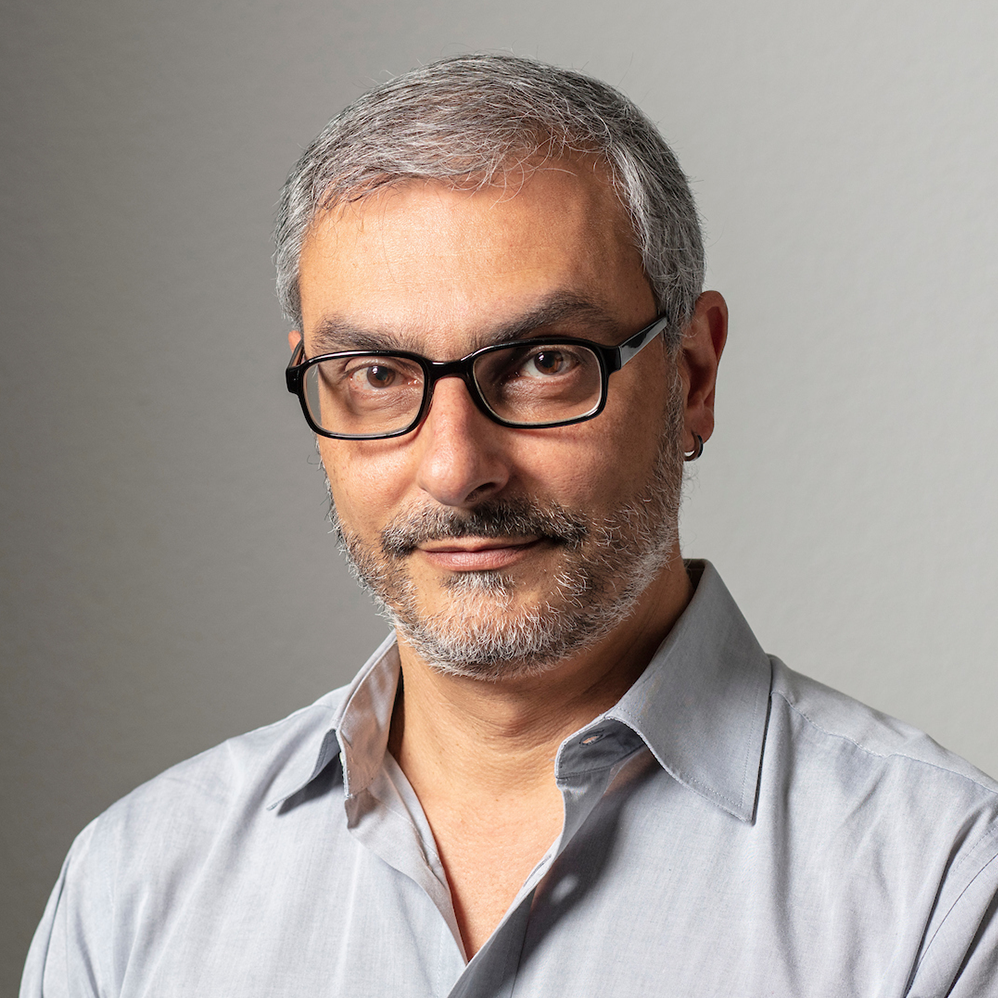
The many lives of Barbet Schroeder, a global Swiss par excellence

Barbet Schroeder, the most international of Swiss filmmakers, brings his new work, Ricardo and Painting, to the Locarno Film Festival and talks to SWI swissinfo.ch about his six decades devoted to cinema.
When asked what being Swiss means to him, Schroeder says that his homeland is not the country but the French-speaking city of Lausanne. The filmmaker, who turns 82 on August 26, was actually born in the Iranian capital, Tehran, spent his childhood in Colombia and at the age of 11 moved with his family to France, where he completed his studies at the Sorbonne University.
As a teenager, Schroeder began to watch the films shown at the Cinémathèque Française, a meeting point of film lovers, many of whom would later become the most influential filmmakers and critics of France, and beyond.
There he met the group around the magazine Cahiers du Cinéma that launched the Nouvelle Vague, the so-called new wave of French cinema. He worked with Jean-Luc Godard, François Truffaut and Eric Rohmer.
His first movie as director was More (1969), about heroin addicts in the hippie paradise of Ibiza, Spain. The soundtrack by British rock group Pink Floyd helped to extend the film’s fame for decades. After that, Schroeder filmed in Africa, Asia, Hollywood, Colombia, among many other places.
Schroeder’s Ricardo and Painting, one of his most personal works, is now being screened at the Locarno Film Festival. It celebrates a friendship of over 40 years with the France-based Argentinian artist Ricardo Cavallo.

SWI swissinfo: You have a German name, but your native language is French, right?
Barbet Schroeder: Yes. My father has a German name because his family went to Geneva from Hamburg. So he ended up being ultra Swiss while my mother didn’t want to speak German because of the [Second World] War, so she chose a guy that spoke French.
SWI: Was your mother Jewish?
B.S.: No. She was very close to many Jewish people and all her life she had Jewish friends.
SWI: So German was never spoken at home?
B.S: Never.
SWI: And you don’t speak German?
B.S.: Not at all. Not one word.
SWI: Your interest in movies also started at this very early age?
B.S.: No. The first movie I saw, I was taken out of the movie crying, and my mother decided that movies were not for me, for I was too sensitive. And the movie was Bambi. Only years later, already in Paris, I started seeing the Cinémathèque movies. But I didn’t go to the theatre normally, like a normal child.
SWI: Your career in films is quite broad, after all you played all kinds of roles: director, producer, actor…
B.S.: You can cross actor and producer. My life is to make movies.
SWI: Your career started as assistant to the Nouvelle Vague directors, such as Godard…
B.S: I had a master, who was Eric Rohmer. One day I went to the office of [magazine] Cahiers du Cinéma, where he was one of the film critics, and approached him and said how much I admired his work. And then he said, you know what, you can help me. And then we started making films together with no money whatsoever.
But then he got fired from the magazine – that was Jacques Rivette who fired him – and Rohmer suddenly was on the streets with no money. I was with him the day he got fired. And he said, “Well, I guess I’m going to start another magazine like the Cahiers”.
And I said, “No, I’m going tomorrow to deposit the papers to open a film company [Les Films du Losange], and this is what I’m going to do and you’re going to be part of it.” I was 21 years old! And I said, we’re going to do your movies and the movies of great directors, and that’s what happened.
SWI: This partnership lasted until the end of his life. Can you share what is your fondest memory of Rohmer?
B.S.: Um, so many… but there was this time when we were shooting something, I think it was Le Genou de Claire (Claire’s Knee, 1970)… a scene where an actor had to pick a flower. As we were preparing the production, Rohmer planned the planting of that flower for it to grow in time to be used in the movie. We made the plant grow and reach maturity exactly in the day we needed it in the shooting. With Rohmer, apart from the dialogues in his films, there was no improvisation in the making of his films. Everything was prepared down to its smallest details. We knew exactly where and when we would shoot. So that’s quite a lesson there.
SWI: How was your relationship with Godard?
B.S.: First I was an apprentice assistant on Les Carabiniers (The Carabineers, 1963), and later on I was his producer in his part of the collaborative film Paris Vu Par (Six in Paris, 1965). He was a wonderful person, very intelligent and funny.
SWI: What do you think of the way he decided to take his life last year, through assisted suicide?
B.S.: Wonderful, I admire this very much. It was very well planned. If I find myself in the same situation, I will do the same.
SWI: Did you also have a close relationship with Swiss filmmakers of your generation, such as Fredi M. Murer or Daniel Schmidt?
B.S.: Daniel Schmidt (1941-2006) was my closest friend. It was very important for me to see and to understand Switzerland through his eyes.
SWI: And then, moving from France, from the Nouvelle Vague to Hollywood, how was this transition?
B.S.: I always had in mind that I was going to Hollywood. For me, cinema was Hollywood. And my first movie More was a Hollywood movie. It was in English, with an American actress so I consider that my very first movie was already an American movie.
SWI: How much into the counterculture were you at that time?
SWI: And did Hollywood correspond to your expectations?
B.S.: Sure! I knew how they made movies there. And it is an incredible luxury to be making movies that way because whatever you need you can get. And most of the time when you make movies with no money, most of what you need, you can never get. Besides, I would never do a movie if I didn’t have the final cut my way. And none of my projects in Hollywood was done just for the money.
SWI: Would you still like to make Hollywood movies today?
B.S.: No, because I don’t like special effects. It’s boring to spend your days in front of a blue screen making special effects. Of course, if you have a great story and great actors, it’s always worth it. But I don’t like the time it takes to make special effects. They make no movies there any more without special effects.
SWI: You worked on several projects that became what is now known as your Trilogy of Evil, which includes the films General Idi Amin Dada: A Self Portrait (1974), Terror’s Advocate (2007), and The Venerable W. (2016). Did you plan other films along this line?
B.S.: Oh, yeah, I had many other projects that didn’t get made. There was one about the [Cambodian] Khmer Rouge [regime] and [its leader] Pol Pot. I had another one with former Argentinian president Isabelita Perón, who could never replicate [former Argentinean first lady] Eva Peron, Evita, and was toppled by a military coup in 1976, and some others. Unfortunately, there are endless subjects to try to understand evil. But I think I’ve given up because I concluded that there’s no evil, that it’s just part of humanity.
SWI: If you had the opportunity or the will to do another film along those lines today, where would you focus on?
B.S.: There is a guy that should be treated, the one who replaced [Ugandan leader] Idi Amin Dada, Yoweri Museveni. He’s a pretty awful person. He passed laws in Uganda outlawing any form of homosexual relationship This president is even worse than Amin Dada. He is the one who actually had the courage, or the weakness, to pass these laws and set a trend that’s spread to Kenya and other African countries.
SWI: In your latest film, you share with the viewer your views and Ricardo Cavallo’s views on art. Are you an art collector, too?
B.S: I started a little bit, but most of my collection is of Ricardo Cavallo’s works. More recently I also got interested in a Swiss artist who has been dead for some years, Jürg Kreienbühl. For me he’s a total genius, and I have a few of his artworks.
SWI: Is your interest in art something more recent?
B.S.: No, it’s a long-time thing. It comes from my mother who didn’t know where to put us, my sister and me, when she came to Paris. She didn’t know anybody, and she decided to use the Louvre as a garderie (day care). So we were able to see many, many things, me and my sister, for all those hours. It left a lasting impression on us.

More
Locarno Film Festival announces programme for its 76th edition

In compliance with the JTI standards
More: SWI swissinfo.ch certified by the Journalism Trust Initiative






























You can find an overview of ongoing debates with our journalists here . Please join us!
If you want to start a conversation about a topic raised in this article or want to report factual errors, email us at english@swissinfo.ch.